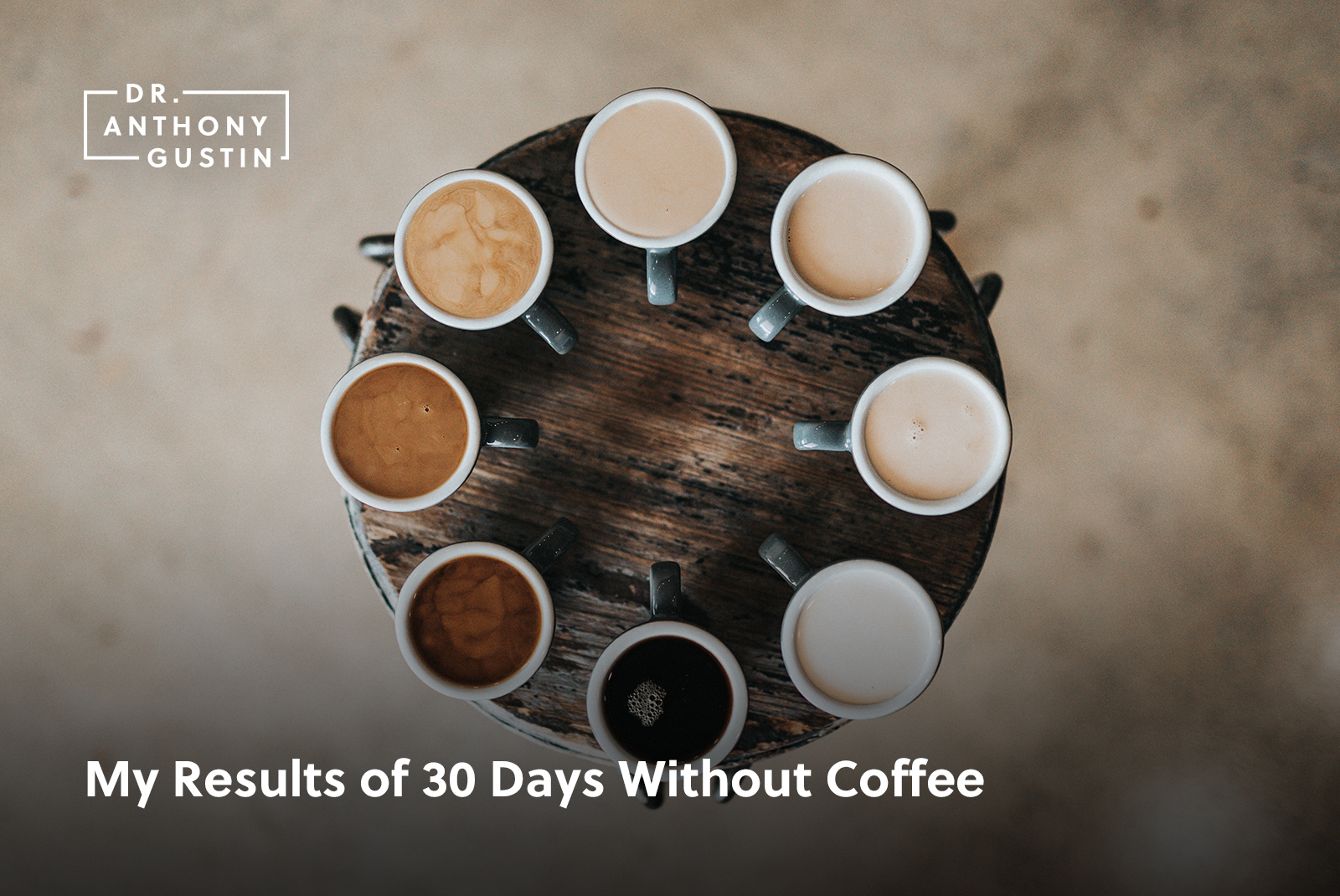10 Reasons Why I’m Fasting Regularly

Why the hell would anyone want to fast?! This is a question I was blasted with when I mentioned recently that I’d been fasting.
I’m used to pushback from people when something I do goes against a strongly held paradigm. This time the challenged belief is “humans need to eat every few hours or else they will wither and die.” When you look at the facts opposing this paradigm, you uncover a lot of interesting data that should essentially compel you to fast on a regular basis.
When I mention fasting, I’m not talking about a juice fast or some cabbage soup diet. I’m also not talking about a hunger strike, minimal water, no food type of fasting. I think for a few different reasons (and especially if you have underlying medical conditions) this is not a safe approach without medical supervision.
My current protocol and view of appropriate “fasting” is modeled after Valter Longo’s research in what he calls a fasting mimicking diet, showing that when you consume between 500-750 calories per day, you get a lot of the same benefits (or more) of fasting, while drastically minimizing the downside. [1]
In this state, your body is essentially getting all of the metabolic triggers that you would without food, yet has enough sustenance to prevent any type of metabolic problems or electrolyte imbalances that can lead to unwanted side effects.
His version calls for a Mediterranean diet macronutrient skew, while mine looks more like a traditional ketogenic diet profile, for reasons detailed later.
A day on this “modified fast” for me would look something like this:
A tablespoon of coconut oil, ¾ can coconut milk and ¾ carton of bone broth.
I also add in some liver tablets for micronutrient support, some salt and magnesium to buffer electrolyte loss, as well as 5-10g of BCAA to prevent any type of lean tissue loss. Exogenous ketones on days 1-2 until I hit deep nutritional ketosis.
This fasting diet can be cycled from 3-7 days, with most of the positive research landing around the five-day mark, or when your glucose ketone index is below 1.0. More on the GKI in another post.
And guess what — this type of modified fasting is not even that bad! You are reminded a few times that you are hungry, otherwise, it is business as usual.
Okay, right, but why the HELL would anyone want to do a (modified) fast in the first place? Here are only some of the reasons, but most important to me:

1: Fasting purges cancerous and precancerous cells
One of the main reasons fasting on a regular basis is interesting to me the overwhelming amount of research calling fasts as close to a “cancer insurance policy” one could get. [1] [2]
There is a fiery debate going on right now around the origins of cancer and whether it is mediated by defects in mitochondrial dysfunction and oxidative phosphorylation which causes genetic mutations, or genetic mutations themselves. [7] [8]
Regardless of the way you look at the origin, there is a very simplified and basic way cancer cells survive and multiply. Cancer cells get their energy from lactic acid, essentially from the breakdown of carbohydrate into glucose into pyruvate into lactic acid. Cancer cells don’t have the luxury of using ketones or the TCA cycle to produce energy.
What the hell does that mean? It means that cancer cells eat sugar (see also: carbohydrates). They are starving little monsters that need to eat and divide constantly. If you take away their food supply, they die. [9]
You get baseline levels of glucose and sugars even if you are on a ketogenic diet, albeit less of them, and the only way to drastically reduce glucose enough to kill as many cancer (or precancerous cells) is by, you guessed it — not eating.
Fasting, caloric restriction, and ketosis is now used in conjunction with other mainstream treatment protocols like radiation and has been found to have profound effects on stalling or eliminating tumor growth. [2] [3] [4] [5]
Cancer runs rampant in my family. Whether this extremely high incidence occurs from gene expression, epigenetics, or mostly environment, is unknown. Instead of not knowing, I’d rather buy the insurance — and as much of it as I can.
This is also one of many reasons I think juice fasts are ridiculous. I shouldn’t need to go into this, but no matter how organic and cold pressed your juice is, it is still sugar water. You are feeding these problematic cells with exactly the fuel they crave.
2: Fasting rapidly shifts you into nutritional ketosis
This is more of a personal benefit for me, but should probably be considered for others as well. The benefits of ketosis are grossly misunderstood, basically because 99% of people are not doing it correctly.
I can (and probably will) write another post like this one about why ketosis is a desired metabolic state. For me, at this time, ketosis is a desired metabolic state. And there is nothing like fasting to get the body into a metabolic state of ketosis.
Ketosis is the state of breaking down fatty acids into ketone bodies for a source of energy.
If you have nothing to run on for an energy source, creating ketones from fat stores is a completely desirable (and normal) metabolic process. Again, there any many benefits for this, and you can see my strict keto biomarkers and experiment here.
I’ve gotten into ketosis with and without fasting, and it happens much quicker with fasting. And again, for me this modified fasting is no big deal and not a problem, so why wouldn’t I try to reach my goal quicker? If fasting were ONLY a tool to get into ketosis quicker, I would use it for that reason alone.
3: Fasting decreases in fat tissue
Decreased fat mass is something most people probably are okay with. This is a pretty obvious effect that your body has switched into ketosis. With the lack of carbohydrate (and some extent, protein), your body starts breaking down fat to form ketones for energy.
Most people think that fasting causes lean tissue wasting and your body begins to break muscle tissue down to create energy. This is actually the exact opposite thing that happens in fasting when switching quickly into ketosis.
Important to note here is that the production and utilization of ketones is a protein sparing mechanism. [6] Not eating (much) and being in ketosis means that we are not using lean tissue OR dietary fat for energy metabolism. This means the body prefers using stored fat -> fatty acids -> ketones for energy. This means less fat mass.
Everyone’s goals are different and I have no problem with my body composition, but losing a few pounds of fat mass for energy use is a nice little side effect regardless.
4: Fasting increases gene expression for longevity and healthspan
Another bonus of fasting is that it is tightly tied to longevity, aka living longer. This is due to an extreme cascade of gene expression changes that happen when you fast.
But what is gene expression? A really simple way to look at this is that genes can either be turned “on” or “off”. Fasting flips a lot of switches, and this can affect aging and longevity pretty drastically.
Research has found that short bouts of fasting increased lifespan up to 100% across multiple organisms (bacteria, yeast, worms, mice). [10]
Not only does fasting improve longevity, it seems to also promote better healthspan. [11] Meaning not only do things live longer, they have a high quality of life for that longer time as well.
Most people see aging as a general decline, whereas what it should be is a plateau until you fall off of a cliff and hit rock bottom (also known as death). I don’t feel like dying much, so I prefer to max out these numbers as much as possible.
5: Fasting leads to autophagy and apoptotic cellular clearing/repair
Over time, the cells in your body undergo damage that makes them less efficient and less effective. An awesome trick in fasting is that your body tags these cells as either needing repair or needing to be cleaned out entirely.
This leads to better functioning old cells, or better functioning new cells. Both of these things are really good for your health.
There are many factors that contribute to this benefit, but a huge point is that fasting greatly aids in cellular regeneration. [11] [15]
6: Fasting improves insulin sensitivity
Many metabolic problems stem from your body’s resistance to insulin. Long story short, when your body is always eating, even on low carb diet, you are secreting insulin. The spikes of insulin are larger when eating a high carbohydrate diet, but they still happen to a lessor degree following any meal.
Insulin resistance leads to metabolic problems and things like Type II diabetes. This is not good.
When you give yourself 3-5 days without any type of food, your body improves insulin sensitivity, even well beyond the time you are fasting. [16] This means a better metabolism, lower risk of Type II diabetes.
7: Fasting decreases oxidative stress and inflammation
Inflammation and oxidative dress are drivers that are directly linked to many disease states, including neurodegenerative diseases, heart disease and cancer.
Remember the little mention above that cells end up accumulating damage? This is why. Turns out fasting can help drastically reduce inflammation and oxidative stress.
My research and conclusions have led me to believe that a high-fat, ketogenic diet is the best for reducing inflammation over the long term. However, fasting has been shown to be even more effective at reducing inflammation than high-fat diets in the short term and can have a profound lasting effect. [14] [17]
8: Fasting enhances cognitive performance and neuroprotection
Fasting has shown countless times to improve cognition and protect the brain from many unwanted effects. I like using my brain, so this is a really great benefit to me. What about you?
Periodic fasting in mice showed improvement of both short term and long term memory, and also reaction time. [11]
Fasting has also been shown to exhibit several neuroprotective effects, helping mitigate diseases like Alzheimer’s [18] and preventing strokes [19].
Not only, that fasting can also help to grow new neurons in the brain [20] [21]. Fasting also increases BDNF (or brain-derived neurotrophic factor), a protein that improves the function of cells in the brain, protects them against damage and cellular death. Essentially, the more BDNF, the better your brain is.
In my opinion, a lot of these mental improvements happen due to the brain functioning on ketones, not necessarily fasting entirely, but fasting inherently leads to ketosis and these neuronal and cognitive benefits.
9: Many psychological benefits to fasting
Another great benefit that most people downplay is the psychological benefits of fasting.
Tim Ferriss, an insanely successful entrepreneur and regular faster, quotes Seneca often in the reason why he fasts, which suggest along the lines to dress in awful clothes, and eat the scantest of fare, all the while asking oneself “is this the condition which I so feared?”
Elon Musk in the past only ate what he could buy for $1/day for at least a month to make it very clear to him that if all fails, he will be fine and will still be able to work and make an impact.
There is a liberating feeling when you fast from 4-5 days and feel perfectly fine, knowing that if the worst case scenario was you had to go without food, it actually isn’t that bad. Of course this is not nutritionally sustainable, but life goes on.
Questioning the things other people think are insane helps me keep me on top of the constant evaluation of my own beliefs.
You’ll lose all your muscle on a fast!
You’ll mess up your metabolism on a fast!
Didn’t you know breakfast is the most important meal of the day?!
These are all things that I believed at some point, but I’m someone who is constantly trying to improve my thinking. That comes with stripping down belief systems to check if they are a construct of an automatic assumption loop, or if they actually hold any merit.
It turns out, none of these things are true.
Most people can’t go three hours without eating. Fasting would help them cultivate mindfulness around the fact that hunger is actually a normal human feeling.
10: Fasting isn’t that bad
This is a fact that a lot of people don’t really highlight. Just like if you think working out is going to be awful, it ends up being awful, fasting has the same mentality influence. If you think fasts are going to be miserable and all you are going to think of is food, what do you think you’ll think of? Being miserable and not eating food.
When you just accept it as something that is normal and just a part of your routine, it really isn’t bad. The thought shocks many people who think you need to eat 5-7 times per day or else you’ll die, but if you haven’t done at least a fasting mimicking diet fast, then there is no room to judge.
Fasting is also far easier if you ease into the fast and use a fasting mimicking diet as explained earlier with supportive supplements.
No downside to fasting, only upside
These are just my top ten reasons of fasting, and there are still plenty more benefits that may apply to your individual goals or health status.
When you take a step back and consider all of these benefits, and the only downside is that I might be hungry a little bit and can’t eat things as a mean for satisfying mouth pleasure for a few days? Really?
Weighing the potential downsides versus the potential upsides, routine fasting seems risky NOT to do.
Similar to the old adage in mindfulness, if you don’t have time to meditate for five minutes, you should meditate for an hour — if you can’t go without food for an hour, you should fast for a day.
—
1: Brandhorst, Sebastian, and Valter D. Longo. “Fasting and Caloric Restriction in Cancer Prevention and Treatment.” Metabolism in Cancer Recent Results in Cancer Research (2016): 241-66. Web.
2: Klebanov, Simon. “Can Short-Term Dietary Restriction and Fasting Have a Long-Term Anticarcinogenic Effect?” Interdisciplinary Topics in Gerontology Mechanisms of Dietary Restriction in Aging and Disease (2006): 176-92. Web.
3: Seyfried, T. N., T. M. Sanderson, M. M. El-Abbadi, R. Mcgowan, and P. Mukherjee. “Role of glucose and ketone bodies in the metabolic control of experimental brain cancer.” British Journal of Cancer 89.7 (2003): 1375-382. Web.
4: Woolf, Eric C., Nelofer Syed, and Adrienne C. Scheck. “Tumor Metabolism, the Ketogenic Diet and Β-Hydroxybutyrate: Novel Approaches to Adjuvant Brain Tumor Therapy.” Frontiers in Molecular Neuroscience 9 (2016): 122. PMC. Web. 25 Jan. 2017.
5: Abdelwahab, Mohammed G. et al. “The Ketogenic Diet Is an Effective Adjuvant to Radiation Therapy for the Treatment of Malignant Glioma.” Ed. Peter Canoll. PLoS ONE 7.5 (2012): e36197. PMC. Web. 25 Jan. 2017.
6: Manninen, Anssi H. “Very-Low-Carbohydrate Diets and Preservation of Muscle Mass.” Nutrition & Metabolism 3 (2006): 9. PMC. Web. 25 Jan. 2017.
7: Otto, Angela M. “Warburg Effect(s)—a Biographical Sketch of Otto Warburg and His Impacts on Tumor Metabolism.” Cancer & Metabolism 4 (2016): 5. PMC. Web. 25 Jan. 2017.
8: Senyilmaz, Deniz, and Aurelio A. Teleman. “Chicken or the Egg: Warburg Effect and Mitochondrial Dysfunction.” F1000Prime Reports 7 (2015): 41. PMC. Web. 25 Jan. 2017.
9: Gillies, R. “Causes and Consequences of Increased Glucose Metabolism in Metastatic Cancers.” European Journal of Cancer Supplements 6.9 (2008): 65. Web.
10: Longo, Valter D., and Mark P. Mattson. “Fasting: Molecular Mechanisms and Clinical Applications.” Cell metabolism 19.2 (2014): 181–192. PMC. Web. 25 Jan. 2017.
11: Brandhorst, Sebastian et al. “A Periodic Diet That Mimics Fasting Promotes Multi-System Regeneration, Enhanced Cognitive Performance and Healthspan.” Cell metabolism 22.1 (2015): 86–99. PMC. Web. 25 Jan. 2017.
12: Cheng, Chia-Wei et al. “Prolonged Fasting Reduces IGF-1/PKA to Promote Hematopoietic Stem Cell-Based Regeneration and Reverse Immunosuppression.” Cell stem cell 14.6 (2014): 810–823. PMC. Web. 25 Jan. 2017.
13: Shushimita, Shushimita et al. “Dietary Restriction and Fasting Arrest B and T Cell Development and Increase Mature B and T Cell Numbers in Bone Marrow.” Ed. R. Lee Mosley. PLoS ONE 9.2 (2014): e87772. PMC. Web. 25 Jan. 2017.
14: Lavin, Desiree N. et al. “Fasting Induces an Anti-Inflammatory Effect on the Neuroimmune System Which a High-Fat Diet Prevents.” Obesity (Silver Spring, Md.) 19.8 (2011): 1586–1594. PMC. Web. 25 Jan. 2017
15: Alirezaei, Mehrdad et al. “Short-Term Fasting Induces Profound Neuronal Autophagy.” Autophagy 6.6 (2010): 702–710. PMC. Web. 30 Jan. 2017.
16: Barnosky, Adrienne R., Kristin K. Hoddy, Terry G. Unterman, and Krista A. Varady. “Intermittent fasting vs daily calorie restriction for type 2 diabetes prevention: a review of human findings.” Translational Research 164.4 (2014): 302-11. Web.
17: Johnson, James B. et al. “Alternate Day Calorie Restriction Improves Clinical Findings and Reduces Markers of Oxidative Stress and Inflammation in Overweight Adults with Moderate Asthma.” Free radical biology & medicine 42.5 (2007): 665–674. PMC. Web. 30 Jan. 2017
18: Wolfe, Devin M. et al. “Autophagy Failure in Alzheimer’s Disease and the Role of Defective Lysosomal Acidification.” The European journal of neuroscience 37.12 (2013): 1949–1961. PMC. Web. 30 Jan. 2017.
19: Arumugam, Thiruma V. et al. “Age and Energy Intake Interact to Modify Cell Stress Pathways and Stroke Outcome.” Annals of neurology 67.1 (2010): 41–52. PMC. Web. 30 Jan. 2017.
20: Lee, Jaewon, Kim B. Seroogy, and Mark P. Mattson. “Dietary restriction enhances neurotrophin expression and neurogenesis in the hippocampus of adult mice.” Journal of Neurochemistry 80.3 (2002): 539-47. Web.
21: Lee, Jaewon, Wenzhen Duan, Jeffrey M. Long, Donald K. Ingram, and Mark P. Mattson. “Dietary Restriction Increases the Number of Newly Generated Neural Cells, and Induces BDNF Expression, in the Dentate Gyrus of Rats.” Journal of Molecular Neuroscience 15.2 (2000): 99-108. Web.




